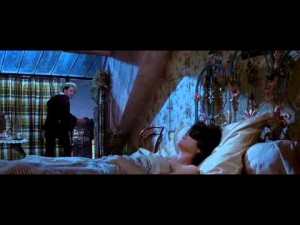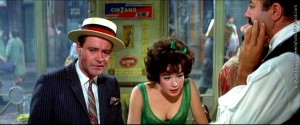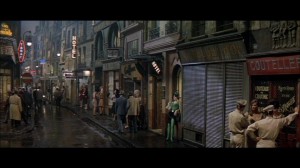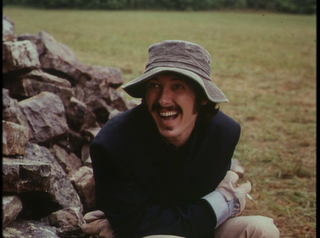I am reprinting the entirety of my first and most ambitious book (Moving Places: A Life at the Movies, New York: Harper & Row, 1980) in its second edition (Berkeley: University of California Press, 1995) on this site in eleven consecutive installments. This is the fifth.
Note: The book can be purchased on Amazon here, and accessed online in its entirety here. — J.R.
2— On Moonlight Bay as Time Machine
A small Midwestern town in 1916, possibly in June. Behind a succession of pink and green credits that they will never see, acknowledge, or understand—a list of names and functions that fasten themselves to a Warner Brothers release, On Moonlight Bay , dated 1951—a family is seated in the dark parlor of a Booth Tarkington house, watching slides of themselves on a screen.
Taste it if you can: 1916. Tarkington’s Penrod and Sam, a sequel to his very popular Penrod, has either just appeared in hardcover or is about to. Germany has declared war on Portugal, Russia has invaded Persia, 8,636 English and German sailors have perished in a naval battle off Jutland, and Gordon MacRae—whom we hear with Doris Day singing the title tune over the credits, but haven’t yet seen—has just completed his junior year at the University of Indiana, and is deeply shaken by all this strife in Europe. Read more
From the Chicago Reader (January 14, 1995). — J.R.

Billy Wilder’s soggy and uninspired 1963 adaptation of the hit Broadway musical, minus the songs. Shirley MacLaine stars as a Paris prostitute with a heart of gold who falls for a former policeman (Jack Lemmon) who winds up as her pimp and, in disguise, her only customer. A good example of how a movie can be utterly characteristic of its maker and still fall with a resounding thud; with Lou Jacobi and Herschel Bernardi. (JR)


Department of utter bafflement (February 2015): Thinking I might have missed something (the film was, after all, a smash hit, and was treated by Godard as if it were Wilder’s belated blossoming as a filmmaker, even making the ninth spot in his ten-best list for 1964, between The Nutty Professor and Two Weeks in Another Town), I recently made a return visit to this movie on DVD and found it just as unbearable as before, despite the charm of the Alexander Trauner sets.

Wilder’s major gift, apart from symmetrically pointed plot construction (as in Kiss Me, Stupid and Avanti!), was as a reporter on American bourgeois hypocrisy, and what seems most peculiar in this film is its misreadings of French manners and French bourgeois hypocrisy, which come across as purely American — Parisian pimps out of Damon Runyon (filmed on the same soundstages as Guys and Dolls, at the Goldwyn Studio) and a puritanical cop who seems to hail from the American midwest. Read more
From the Chicago Reader (September 24, 1993). Oddly enough, the version of this piece that’s available on the Reader‘s web site and (until recently) here is missing the final five paragraphs, which I’ve just restored by copying them from the printed version that I still have in one of my scrapbooks. — J.R.

THE MUSIC OF CHANCE
** (Worth seeing)
Directed by Philip Haas
Written by Philip and Belinda Haas
With Mandy Patinkin, James Spader, M. Emmet Walsh, Charles Durning, Joel Grey, Samantha Mathis, and Christopher Penn.

In an interview included in his nonfiction collection The Art of Hunger, Paul Auster gives an intriguing account of the major influences on his novels — an account that suggests why these novels aren’t well suited to conventional movie adaptation:
“The greatest influence on my work has been fairy tales, the oral tradition of story-telling. The Brothers Grimm, the Thousand and One Nights — the kinds of stories you read out loud to children. These are bare-bone narratives, narratives largely devoid of details, yet enormous amounts of information are communicated in a very short space, with very few words. What fairy tales prove, I think, is that it’s the reader — or the listener — who actually tells the story to himself. Read more





